
When and how do we use Gli piace and Le piace? Let's have a look a the indirect object pronouns.
Ciao compagni d'avventura!
Come state? How are you?
Today we are going to learn when and how to use Gli piace or Le piace and Gli piacciono and Le piacciono.
Last week we talked about Mi piace.
To say I like something we need to use the verb PIACERE + the indirect object pronoun MI.
Before introducing the other two pronouns, GLI and LE, let me talk about the indirect object pronouns.
In Italian they are:

These pronouns answer the question A CHI? (to whom?) or PER CHI? (for whom?).
Where do we use them in a sentence?
They normally precede a conjugated verb, except for the third plural person LORO which follows the verb.
Le dico di andare a dormire = I tell her to go to sleep
Dico (a chi?) a Maria di andare a dormire = I tell Maria to go to sleep
Gli do un bicchiere di latte = I give him a glass of milk
Do un bicchiere di latte (a chi?) a Marco = I give Marco a glass of milk / I give a glass of milk to Marco
Note that today GLI is also used instead of LORO for the plural masculine and feminine. Remember: LORO follows the conjugated verb in a sentence.
Mando loro una cartolina = I send them a postcard
Gli mando una cartolina = I send them a postcard
Mostro loro le mie nuove scarpe = I show them my new shoes
Gli mostro le mie nuove scarpe = I show them my new shoes
If an infinitive verb is preceded by dovere, potere, or volere, these pronouns can either be attached to the infinitive verb or can be placed before the conjugate verb.
Dobbiamo chiedergli se vuole venire con noi = We have to ask him if he wants to come with us
Gli dobbiamo chiedere se vuole venire con noi = We have to ask him if he wants to come with us
Posso mandarle dei fiori? = Can I send her some flowers?
Le posso mandare dei fiori? = Can I send her some flowers?
In compound tenses the indirect object pronouns have to precede the auxiliary verbs and don't agree with the past participle (but the direct object pronouns do!).
Hai visto Maria? = Have you seen Maria?
Sì, l'ho vista, ma non le ho parlato = Yes, I have seen her, but I have not spoken to her
Examples:
Vuoi bene a Maria? = Do you love Maria?
Sì, le voglio bene = Yes, I love her
Hai telefonato a tua sorella? = Did you call you sister?
Sì, ma non mi ha risposto. Le ho lasciato un messaggio in segreteria = Yes, but she didn't pick up the phone. I left her a voicemail
Puoi aiutarmi, per favore? = Can you help me, please?
Mi puoi aiutare, per favore? = Can you help me, please?
Vi bastano questi biscotti? = Are these biscuits enough for you?
Maria ci ha chiesto un favore = Maria asked us for a favor
So how does it work with the verb PIACERE?
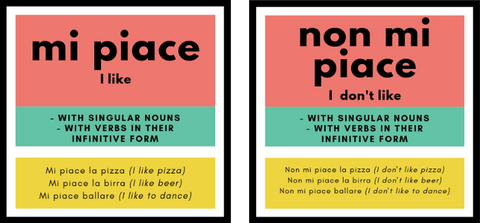
Mi piace la pizza or A me piace la pizza
Mi piace la birra or A me piace la birra
Mi piace ballare or A me piace ballare
Non mi piace la pizza or A me non piace la pizza
Non mi piace la birra or A me non piace la birra
Non mi piace ballare or A me non piace ballare
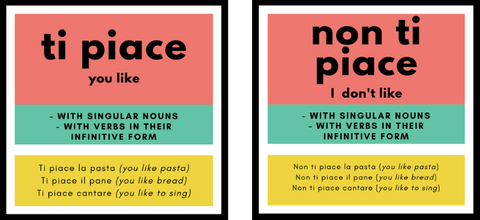
Ti piace la pasta or A te piace la pasta
Ti piace il pane or A te piace il pane
Ti piace cantare or A te piace cantare
Non ti piace la pasta or A te non piace la pasta
Non ti piace il pane or A te non piace il pane
Non ti piace cantare or A te non piace cantare
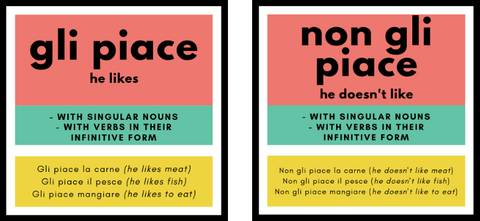
Gli piace la carne or A lui piace la carne
Gli piace il pesce or A lui piace il pesce
Gli piace mangiare or A lui piace mangiare
Non gli piace la carne or A lui non piace la carne
Non gli piace il pesce or A lui non piace il pesce
Non gli piace mangiare or A lui non piace mangiare
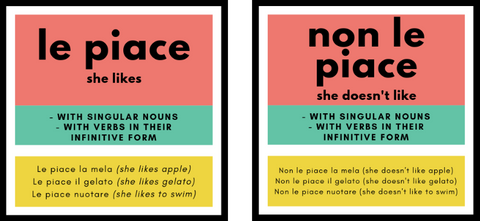
Le piace la mela or A lei piace la mela
Le piace il gelato or A lei piace il gelato
Le piace nuotare or A lei piace nuotare
Non le piace la mela or A lei non piace la mela
Non le piace il gelato or A lei non piace il gelato
Non le piace nuotare or A lei non piace nuotare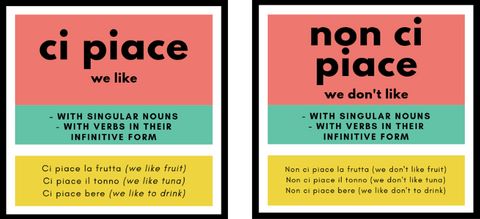
Ci piace la frutta or A noi piace la frutta
Ci piace il tonno or A noi piace il tonno
Ci piace bere or A noi piace bere
Non ci piace la frutta or A noi non piace la frutta
Non ci piace il tonno or A noi non piace il tonno
Non ci piace bere or A noi non piace bere
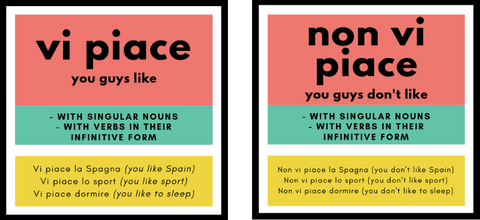
Vi piace la Spagna or A voi piace la Spagna
Vi piace lo sport or A voi piace lo sport
Vi piace dormire or A voi piace dormire
Non vi piace la Spagna or A voi non piace la Spagna
Non vi piace lo sport or A voi non piace lo sport
Non vi piace dormire or A voi non piace dormire
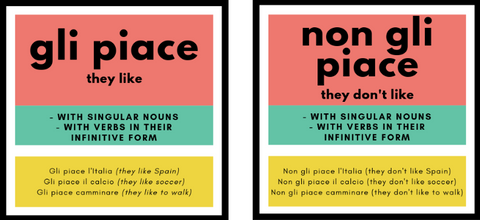
Gli piace l'Italia or A loro piace l'Italia
Gli piace il calcio or A loro piace il calcio
Gli piace camminare or A loro piace camminare
Non gli piace l'Italia or A loro non piace l'Italia
Non gli piace il calcio or A loro non piace il calcio
Non gli piace camminare or A loro non piace camminare
If you wish to do some practice, here you can download our "Verb To Like - 3 free exercises ready to download".
I hope guys this topic is a bit more clear now. Don't be scared to write in the comments if you have any doubts or questions! :)
Ci vediamo al prossimo post!
Simona




